This post may contain affiliate links. Please read our disclosure policy.
Learn how to make rice flour at home by turning plain rice into rice flour. This is as close as I've ever come to homemade superfine rice flour. Save cash money in the long run for sure.
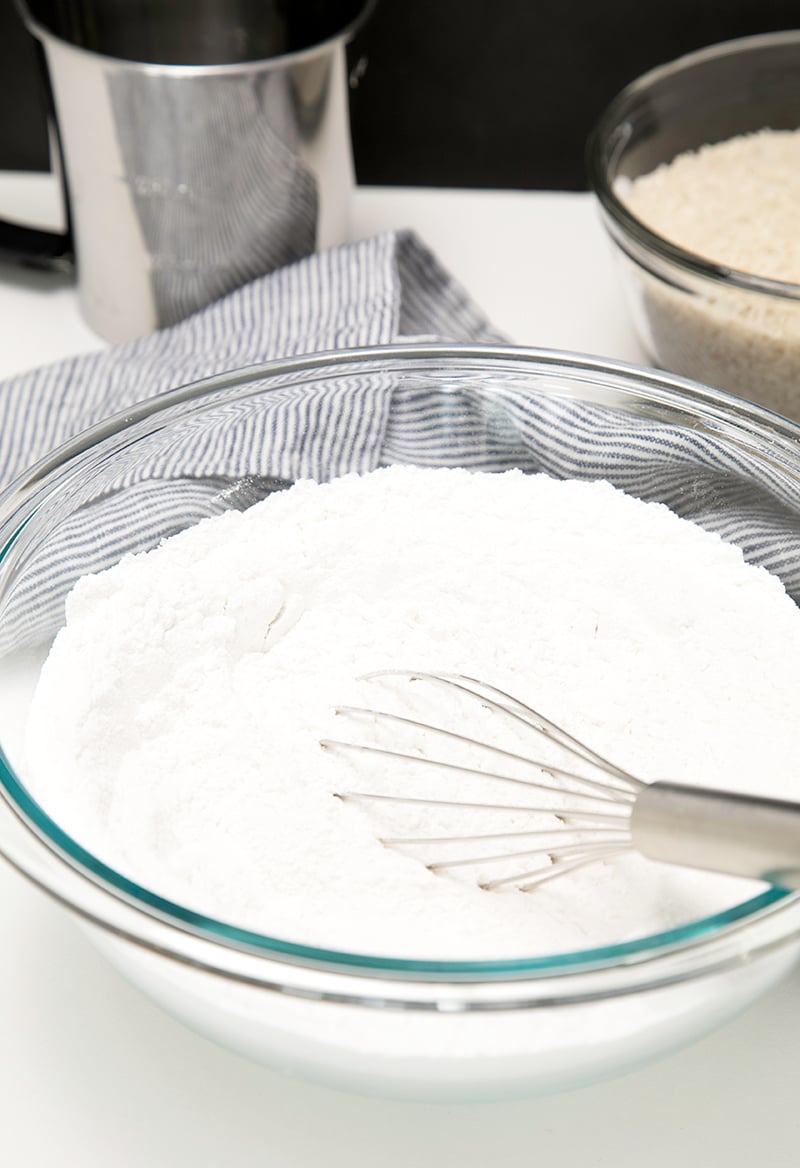
Table of Contents
- Why should you learn how to make rice flour?
- Why is finely ground rice flour so important?
- How to make rice flour that is superfinely ground?
- How to make rice flour from rice
- Why you have to double grind your rice flour
- What about wet grinding to make rice flour?
- FAQs
- Ways I have used my own homemade superfinely ground rice flour
- How to make superfine rice flour at home
- How To Make Rice Flour At Home Recipe
Why should you learn how to make rice flour?
Well, color me surprised. I never ever thought I would be encouraging anyone at all to grind their own rice into flour at home for gluten free baking (or for anything else).
But ever since I learned that it's possible to take plain long grain white rice and, with the right equipment and the right method, turn it into rice flour, I've been determined to show you how to do just that.
(Oh, and if you'd like to know how to use rice flour in your gluten free baking, please see my gluten free flour blends page! Rice flour must be combined with other flours to create an all purpose gluten free flour blend. And if you're wondering, yes, plain whole grain rice is gluten free, much like plain potatoes are gluten free)
Why is finely ground rice flour so important?
When I first began baking gluten free, I used a bean flour blend for my recipes. With you all as my witnesses, I will never ever do that again. Bean flours smell awful, at every level of baking. Just no no no.
Ever since I first started using gluten free flour blends with a rice flour base, I've known how important a finely ground rice flour is.
In fact, the two most important characteristics in a proper gluten free flour blend are how finely ground the rice flour is, and (of course) what else is in the blend to balance out that rice flour.
You could even argue that a finely ground rice is more important than a balanced blend, since you can sometimes rebalance a flour blend with other recipe ingredients (although that can be tough).
But a gritty rice flour is a dead end. There are two reasons for that:
One, a gritty rice flour is often the reason that people will say that a gluten free baked good is “good, for gluten free.” Not just plain good.
The mouth feel of grit is just the worst. It ruins the entire experience, and frankly everyone will judge your baked goods harshly. Because they just won't be very good.
Two, a gritty rice flour will often mean that the ingredients in a recipe simply don't combine properly. You may whisk your dry ingredients together as well as possible, but they'll still resist combining with the rest of the ingredients.
Think of how you can combine different colors of fine sand into a lovely, unified design. But a bunch of pebbles in a jar will always have empty spaces between and among them.
There is one exception, though. If you are allowing the rice flour to rest in a mixture for a long time before baking, as in a slow rising yeast bread, gritty rice grains will soften.

How to make rice flour that is superfinely ground?
The only brand of truly superfine rice flour that I believe you can buy retail is made by Authentic Foods (affiliate link). It is silky smooth, no doubt.
It's what I've always used and recommended, and I still do. But it's not very available in stores (although I buy it online easily), and it's super expensive.
There are other brands of so-called superfine rice flour, like from Vitacost. But in my experience, they're not quite as finely ground as Authentic Foods.
And nothing is going to be cheaper than buying long grain rice itself, and grinding it into flour—in the long run.
How to make rice flour from rice
Since rice itself is so inexpensive, and rice flour is nothing more than ground rice, we should be able to make our own rice flour at home. For that, we need a grain mill.
A blender or a food processor, no matter how powerful, will not make rice flour that is finely ground. In fact, those appliances will only make gritty rice flour, which is precisely what makes gluten free baked goods subpar.
To make rice flour, you must grind it properly enough to use without tasting that awful grit of poor quality rice flours. That requires feeding the rice through a grain mill once, then feeding the already-ground flour through again until it's truly superfinely ground.
How to make glutinous rice flour at home
Use the same method as described here using long grain white rice, but instead use so-called glutinous white rice instead. You will have glutinous rice flour.

Which grain mill should I use?
This post is not sponsored. Some of the product links do contain affiliate codes, which earns me anywhere from a few pennies to a few bucks if you use them to purchase. Feel free to shop around!
I've tried making rice flour at home with a high speed blender. If you search online, you'll find a few sources who promise that it works well enough.
In my experience, though, the result is nothing but a grainy rice flour. And you're limited in how many times you can blend your dry rice.
High speed blenders create heat while they work. That means you simply can't run flour through the blender twice without a lot of trouble. And even if you could continually blend your rice, it wouldn't be finely ground enough.
Most grain mills are designed to grind wheat. Since there are harder and softer varieties of wheat, and wheat in general is not as hard a grain as rice, there are more options for wheat-eaters.
Pretty quickly, I was able to narrow down my choices to three, none of which are suitable for wet or oily grains:
The Komo Classic
The Komo Classic Grain Mill, is made by a well-respected German company. The casing is made from beechwood, and it's a “stone burr” grain mill.
The adjustments you can make in texture with a stone burr grain mill are more precise, as you have a lot of control over adjustments. Fancy, right? Well, Komo mills cost about $450 U.S., give or take. Amazon no longer seems to carry it, but the site I linked doesn't appear to charge shipping within the U.S.
The Nutri-Mill
The Nutri-Mill Grain Mill is a much more reasonably-priced “impact grain” mill. It retails for a bit less than $220 U.S.
It has a very nice compact design, but is louder than option 3 below, and I've read more than a couple reports of the compact design being the cause of mold growing in the housing in between uses. Yuck!
The WonderMill
The WonderMill Grain Mill. This one is my pick, as you can see. The price is the same as the Nutri-Mill, and the WonderMill is also an impact grain mill.
You can only select one of three settings, Pastry, Bread and Coarse, but since I want the finest grind, I don't need more control. This is the mill I selected and purchased.
Why you have to double grind your rice flour
Regardless of which mill you use, you must run your rice through the grinder multiple times. Otherwise, your rice flour will have a gritty feel overall.
It's not that there will be a few larger flakes here and there, which sifting the flour would remove. You must grind twice.
That means passing the rice through the grinder once, then passing the once-ground flour back through the grinder once more. Since a grinder won't heat the rice like a blender, you can grind twice in quick succession.
What about wet grinding to make rice flour?
Indian cooking frequently uses finely ground rice flour in making such dishes as roti. From the research I did online, it seems like wet-grinding is the most common traditional method.
I searched online for a wet grain grinder. I actually was able to find a few machines sold in the U.S. that seemed to be good quality.
But there were warnings everywhere that even the best versions often arrived broken, and customer service was nonexistent. No thank you.
You cannot grind anything wet in any of the three mills I mentioned above. But what about soaking the rice, then drying it and then grinding it?
Based upon the fact that Indian cooks use wet grinders, I tried soaking rice in hot water for 2 hours. Then, I dried it fully at room temperature, and then passed it through my WonderMill dry grinder twice.
To my surprise, the soaked rice was grainier than the rice I hadn't soaked! ? I'll chalk that up to being one of life's little mysteries.
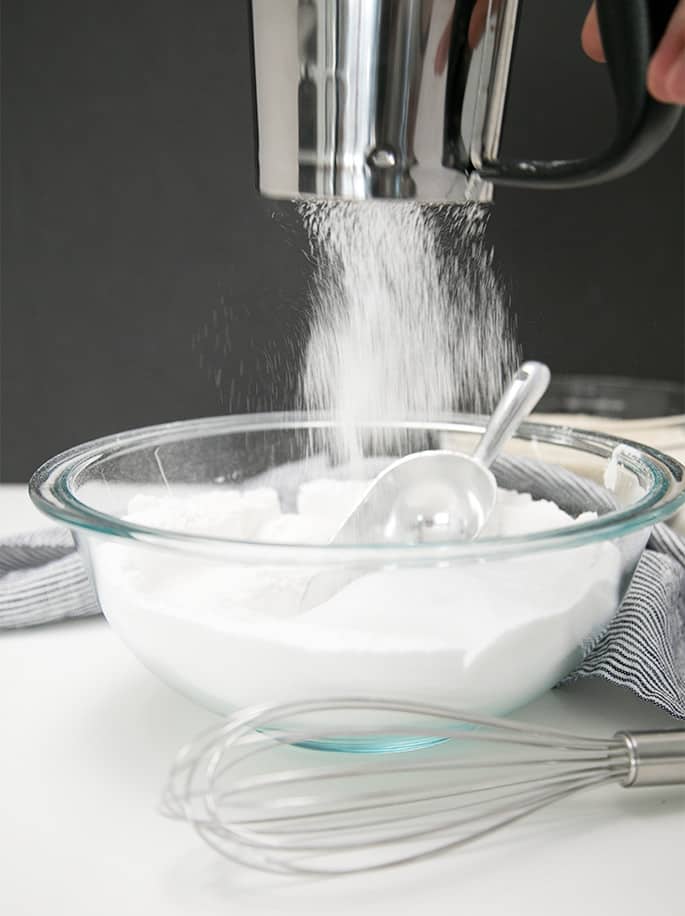
FAQs
I don't necessarily think you should make your own rice flour! But if you want to assemble your own gluten free flour blends based on rice flour, you absolutely should use a superfinely ground rice flour in them. And if you aren't willing to or can't buy that flour, you should make it yourself.
The answer is a relatively unsatisfying, “it depends.” Based upon the current price of Authentic Foods superfine white rice flour of $5.99/pound, and the current price of Mahatma long grain rice of $1.29 a pound, grinding my own rice flour costs $4.70 less a pound.
That's a savings of 78%. But, of course, that doesn't take into account the price of the grain mill, which is about $219. Over time, if you grind all of your own rice flour, you will save money, no doubt. But it will take some time for you to earn back the $219 of the machine. After about 46 pounds of ground rice, you'll have made back your money. And then the rest is yours.
When I purchased this machine, I assumed that I would use it enough to learn whether I could recommend it to you. Then, I would write this post, consider the mill a cost of doing business, and set it aside. But I made at least 10 pounds of rice flour in my testing.
Yes, you can use this same method to make glutinous rice flour, also known as sweet white rice flour. You'll need to begin with short grain white rice, rather than long grain rice, and be sure to grind it superfine, as always.
If you don't mind grainy, poor quality rice flour, you can make your rice flour in a blender or food processor. Otherwise, you will need to use a grain mill and run the rice through it twice to create a palatable rice flour.
It doesn't matter how fancy or high speed your blender is. You will still end up with gritty rice flour. In addition, you can only run a powder through your blender so many times before it heats and begins to clump and burn.
No, these grain mills are dry grinders, not wet. It is almost impossible to find a wet grinder in the United States. When I tried soaking the rice first, then drying it and grinding it in my dry grain mill, the product was grainier than when I didn't soak it first.
There is no substitute for rice flour. In gluten free baking, no single flour can do the work of wheat flour in conventional recipes, so we use a blend. But every truly multipurpose blend is based on rice flour as a primary ingredient and it has no equal. Asking to replace rice flour in gluten free baking is like asking to replace wheat in conventional baking. An entire industry of gluten free recipes was built to make that happen!
In my recipes, 1 cup of rice flour weighs 140 grams, or 5 ounces. Therefore, since weight measurements are accurate no matter the form of the rice (whole or as flour), to make 1 cup of rice flour, you need 5 ounces of long grain white rice.
Ways I have used my own homemade superfinely ground rice flour
I've been using it to make my lovely gum-free blend. So far, I've made pancakes, enchilada sauce, crepes and pudding. So far, so good. It's not as finely ground as Authentic Foods, but it's quite fine. And way, way less expensive.
I've also used the mill to make oat flour from old fashioned oats and chia flour from chia seeds for smoothies. I'm rather enjoying myself.
Only you can decide if it's worthwhile for you to purchase a grain mill to make your own rice flour (and other flours) at home, of course. But the option is at least there.
Options are good!
Oh, and if you'd like to take some of that rice and make rice pudding, I'm not planning to talk you out of it.
How to make superfine rice flour at home
How To Make Rice Flour At Home
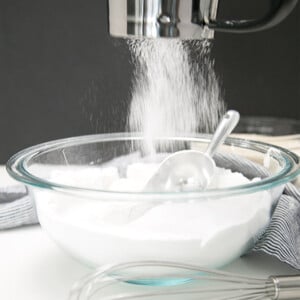
Equipment
- WonderMill Grain Mill or equivalent (See Recipe Notes about grain mills)
Ingredients
- 1 cup (185 g) long grain white rice, (I like Mahatma brand—it's so inexpensive and GF)
Instructions
- Assemble the mill. Then, turn the dial to “pastry” for the finest grind, plug the mill into an outlet, and turn it on by flipping the rocker switch from OFF to ON.
- While the mill is running, feed your desired amount of dry long grain rice in the hopper of the mill. Allow the machine to run until all of the rice grains have worked through the mill.
- The WonderMill's sound will become more high-pitched once it has ground everything. Turn the mill off.
- Detach the canister from the mill, tap the top of the container a few times, and open the lid of the container. The only way to grind rice finely in one of these machines is to grind it twice.
- Transfer all the ground rice to a separate bowl, and reassemble the now-empty mill. Turn the mill on once again, and place the once-ground rice back into the hopper. The mill will take the already-ground rice in more slowly than it did whole rice grains.
- Use a utensil to gently push the flour toward the center of the hopper for it to enter the mill, and tap the hopper as necessary to keep the flour moving.
- Again, the mill will emit a higher-pitched sound when it is finished grinding. Turn off the mill.
- Once again, detach the canister from the mill, tap the top of the container a few times, and open the lid of the container.
- Transfer the finely ground rice flour into a more permanent container with a lid.
- I like to store homemade ground rice in the refrigerator, as I assume it will go bad more quickly than commercially purchased flour.
Video
Notes
Nutrition
Nutrition information is automatically calculated, so should only be used as an approximation.
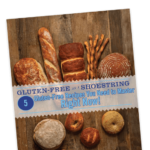

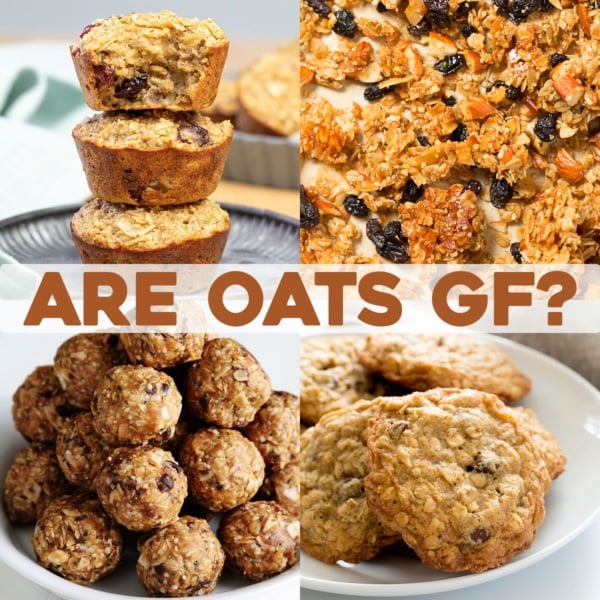

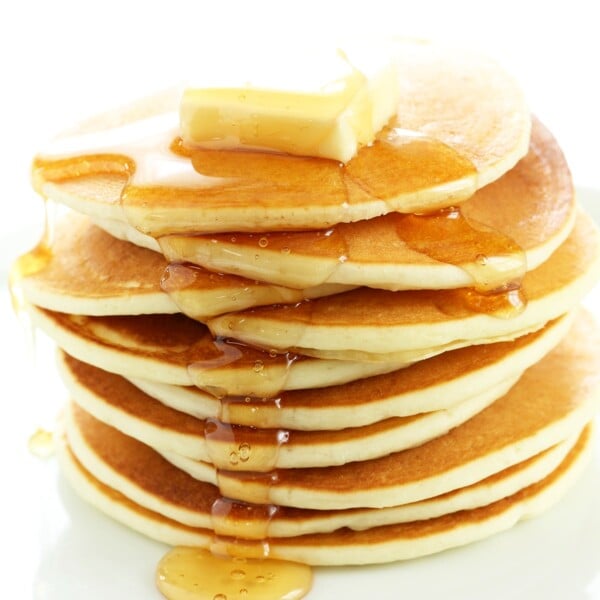










I vote for seeing if kitchenaid would send you a grain mill to try. I just bought a proline 7 quart kitchenaid stand mixer and pasta extruder attachment(sounds like a weapon!) I have been wondering about grain mill for GF flour.
Hello, i was just checking the site “willitgrind.com” from WonderMill and the tapioca pearls are listed as
Able to grind: Yes
Under Warranty: Yes
So that is a good news for those who want to grind tapioca pearls. I have posted a request for Cassava, which is the root from which the Tapioca is extracted. I did get some Cassava flour and found it to be a very good addition to my gluten-free flour blend.
Interesting, Andre! Thanks for sharing that info.
I have a Multi Mill and it has been a lifesaver! In just 6 months it had paid for itself. I have had a wheat mill for over 40 years and it is noisy and messy. My multi mill is faster, quieter and cleaner. I got the Multi Mill for my gluten free needs and still use the wheat mill for my husband’s whole wheat bread. But that might go off to one of my sons as my husband has recently started showing signs of Gluten Intolerance. Having too many allergies to count I have never told him that he can’t have something he loves. He has been so sweet with trying to keep me from having problems. He is especially careful with his beet cans and will often have the things he loves that would kill me when he is off running errands for our business. I am one of the subset of gluten sensitive patients that is also allergic to all things mammal. That makes things hard when I have to prepare two separate meals every time we have a meal. I try to come up with a “base” that can be used for each of us and then make additions to the base that will work for two meals. For instance, I might make stir fry and add mammal meat to his portion and chicken or fish to mine. But life is always changing. So I do appreciate your sharing your wisdom with the world.
As for why tapioca is excluded from the list of things you can mill yourself. Tapioca is hard on the grinder surfaces and in the most cases can clog up the grinding surfaces. Consider it another “oily seed” like flaxseed. You might check with your favorite Health Food store to see if they have a bulk variety of tapioca flour. Our local Health Food stores get it in bulk and re-package it so that it is about half the price of “branded” tapioca flour. Also check the Asian markets in your area. They often have packages of tapioca flour for a fair price.
Hi, Kathy,
Thanks for your story. I’m afraid I do not recommend purchasing flours at Asian food stores, as they are not reliably gluten free, and there is tremendous potential for cross-contamination among bins.
I LOVE that you experimented with grinding your own flour and have shared these results. Before going gluten free eight years ago I ALWAYS ground my own wheat for homemade bread, etc. I really missed that aspect of baking, and bought a new, uncontaminated grinder for gluten-free grains. I’ve had a hard time finding info on what kind of rice to grind. Short grain? Long grain? Medium grain? Basamti? Jasmine? White? Brown? I’ve been using my grinder mostly for sorghum, millet, and teff. I, too, came to the conclusion that putting it through twice was the way to go, so glad to see your validation here. I hope you keep experimenting, and keep passing along your results.
Glad this information is useful to you, Anna!
I do love your site and especially your flour recipes.
Thanks for sharing
Hi Nicole
I see you have made oat flour in your mill, oats contain gluten, albeit slightly different gluten to the other grains and can cause major issues for many coeliacs, especially when people see GF on the label.
My 3 grandsons are all coeliacs and can’t have oats, pulses or legumes so we have to be mega carefull.
I do love your site and especially your flour recipes.
Thanks for sharing
Martha, oats do not contain gluten in the same sense that wheat, barley and rye do, as I discuss in this post. If you need to avoid oats, by all means do what works for you and your family!